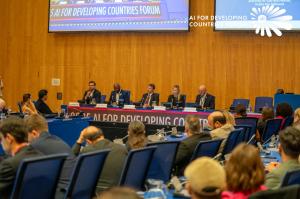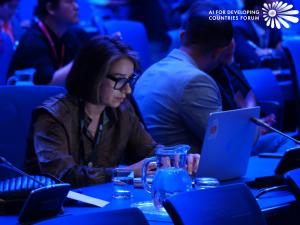AIFOD Holds Breakthrough AI Sessions at UN Vienna, Tackles Global Development Challenges

"Invest in AI for Justice" panel session at the AIFOD Vienna Summit 2025, co-hosted by UNODC and INTERPOL officials, examining how governments can strategically invest in AI technologies for public safety while ensuring equitable outcomes.
Eight specialized working groups produce concrete frameworks for justice, education, and infrastructure investment across developing nations
NY, UNITED STATES, August 1, 2025 /EINPresswire.com/ -- The AI for Developing Countries Forum (AIFOD) concluded three days of intensive working sessions at the United Nations Office at Vienna this week, producing what experts are calling the most comprehensive set of AI investment frameworks ever developed for the Global South.
The independent international organization organized eight parallel sessions that brought together 600 delegates from over 120 countries to address critical questions about deploying artificial intelligence in sectors ranging from criminal justice to education delivery.
"What return is there for the world's majority who are not financially invested in Big Tech?" asked participants in the "Invest in AI for Justice" session, framing a central challenge that dominated discussions throughout the AIFOD summit. The session, co-hosted by officials from UNODC and INTERPOL, examined how governments can invest in AI technologies that enhance public safety while maintaining community trust.
Unlike traditional international conferences focused on broad policy discussions, the AIFOD Vienna sessions produced specific, actionable outcomes. Each working group delivered documented frameworks, partnership models, and implementation roadmaps that delegates can immediately deploy in their home countries.
The most ambitious session tackled open source AI development, addressing growing concerns about technology concentration among major corporations. "How can governments and research institutions collaborate with private companies to accelerate open source AI development that benefits everyone?" asked session organizers, who produced funding models designed to democratize access to advanced AI capabilities.
Dr. Wendy O'Brien, Technology and Innovation Advisor at UNODC, co-hosted the justice-focused session alongside Laurent Lacroix, Chief Data Officer at INTERPOL. Their working group addressed practical questions about implementing AI in law enforcement while ensuring equitable outcomes across diverse communities.
The AIFOD education investment session examined whether AI tools can close learning gaps without widening existing inequalities. Co-hosts from D.O. Solutions and OrbitAID Aerospace led discussions on investment models that ensure quality education access regardless of geography or income level.
A specialized working group on data governance addressed fundamental infrastructure questions about building reliable, inclusive data systems that serve public interests. The session, co-hosted by executives from Digital Encode Limited and Acción Social Empresarial, produced guidelines for ethical data collection and use that drives equitable outcomes.
International participation included officials such as Shohrukh Sharipov from Tajikistan's Permanent Mission to UNOV, who contributed perspectives on building inclusive data systems across challenging geographic and economic contexts. Nina Kickinger from the UN Office for Outer Space Affairs participated in education discussions, demonstrating how specialized UN agencies are engaging with AIFOD's framework development.
The most technically complex session focused on establishing national AI ecosystems, examining how governments can foster innovation while ensuring responsible development serves broader public interests. Led by executives from tech reform GmbH and MediElaj, the working group produced policy frameworks and infrastructure guidance for sustainable AI development.
A significant breakthrough came through the AIFOD FAIR Standards Development Working Group, which established certification standards for community-centric AI governance. The group, featuring participants from Novartis and CIRISK, developed frameworks that balance technological advancement with cultural preservation requirements.
The skills intelligence session addressed workforce disruption from automation, producing partnership models that combine government labor data with private sector innovation to guide career transitions for displaced workers.
The AIFOD program concluded with closed-door strategic meetings for government representatives and senior corporate members to advance specific partnership initiatives based on the frameworks developed during the intensive working sessions.
Each session tackled different aspects of a central challenge: how developing nations can harness AI's benefits while avoiding the pitfalls that have concentrated technology power among a small number of corporations and wealthy countries.
The frameworks produced during the AIFOD Vienna sessions represent a shift from theoretical discussions toward practical implementation tools. Delegates departed the UN headquarters with specific commitments and concrete frameworks they can deploy immediately.
The comprehensive approach demonstrates how AIFOD's innovative conference structure can produce substantive results when diverse expertise is channeled through focused, sector-specific working groups rather than broad policy discussions.
As artificial intelligence continues reshaping global economies, the AIFOD Vienna sessions may represent a turning point where developing nations moved from being technology recipients to active participants in shaping AI's global development trajectory.
Dawid Wiktor
Media Scope Group
email us here
Legal Disclaimer:
EIN Presswire provides this news content "as is" without warranty of any kind. We do not accept any responsibility or liability for the accuracy, content, images, videos, licenses, completeness, legality, or reliability of the information contained in this article. If you have any complaints or copyright issues related to this article, kindly contact the author above.


